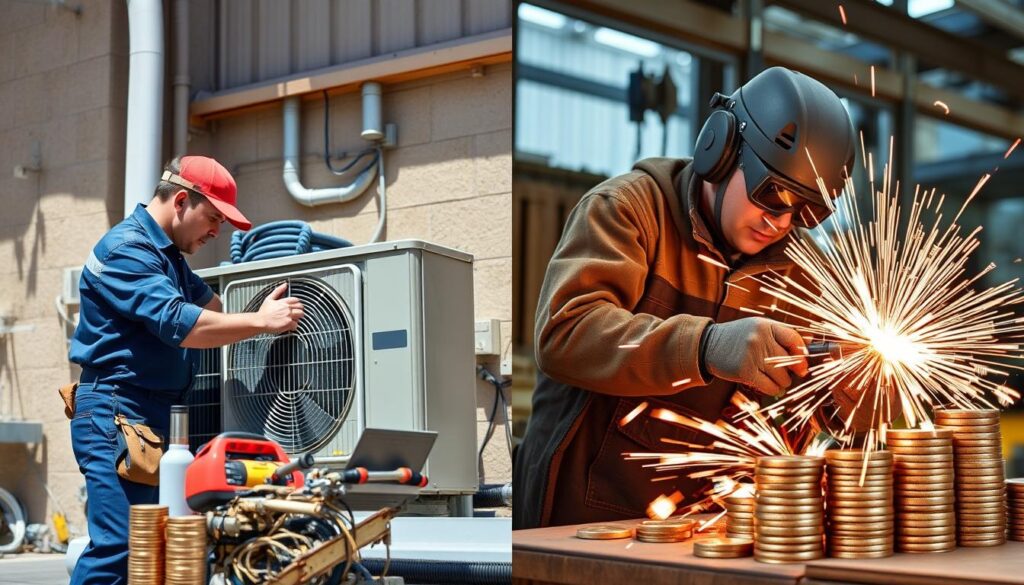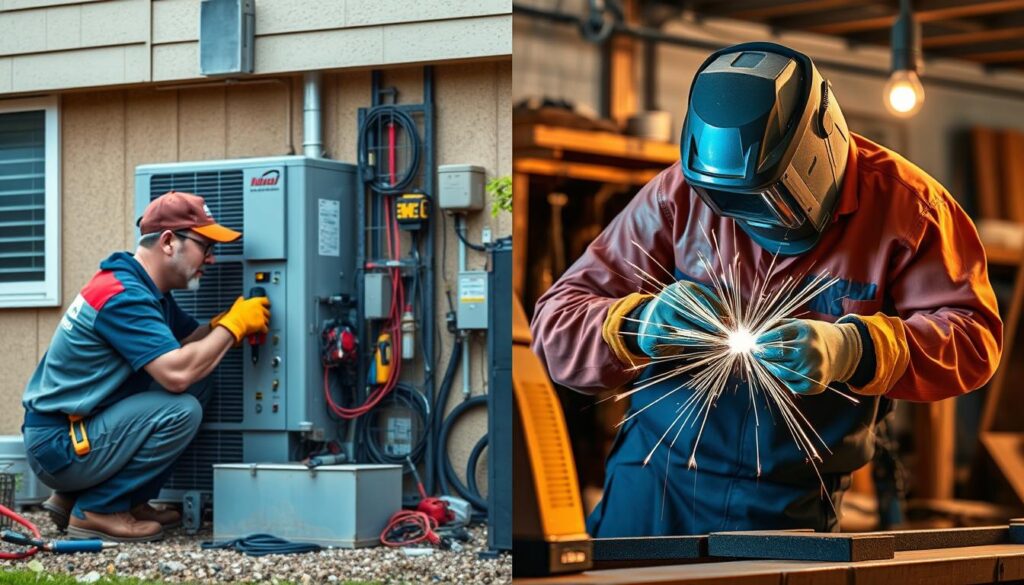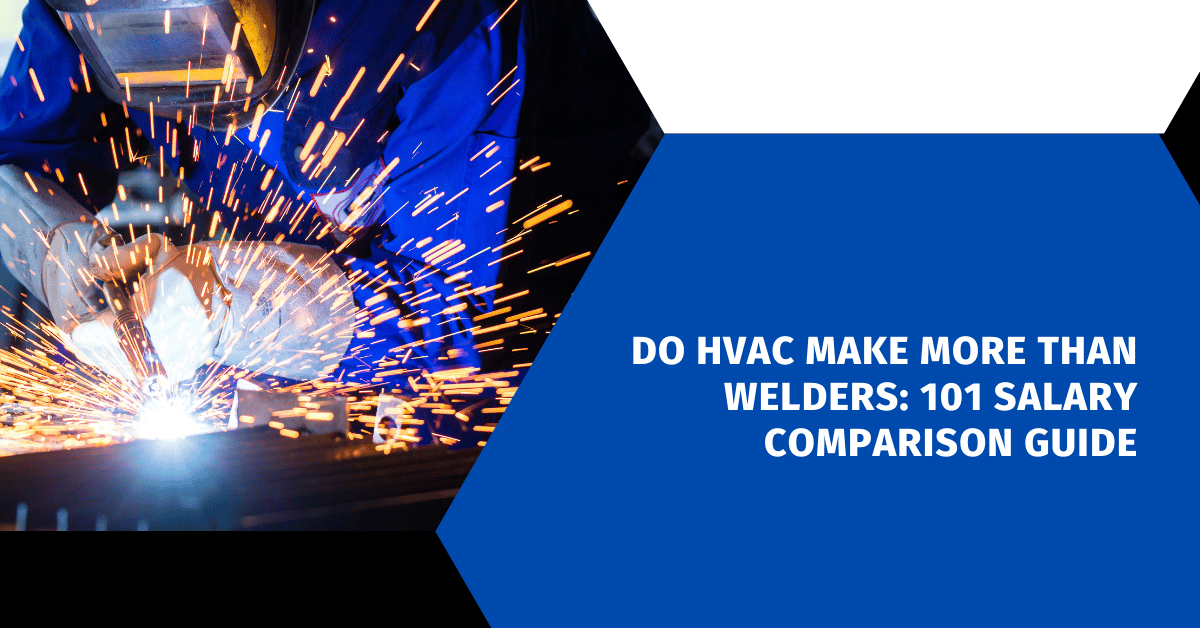Affiliate Disclosure
HVAC Guide Guys is a participant in the Amazon Services LLC Associates Program, an affiliate advertising program designed to provide a means for sites to earn advertising fees by advertising and linking to Amazon.
Do HVAC Make More Than Welders? When you’re thinking about your career, a big question is: do HVAC techs earn more than welders? This choice can greatly affect your money in the future. So, let’s look at the salaries of these skilled jobs.

HVAC techs make about $50,590 a year, or $24.32 an hour. Welders earn a bit less, at $47,010 yearly, or $22.60 an hour. That’s a yearly difference of $3,580, or about $298 a month. While welders’ jobs are growing 8%, HVAC techs’ jobs are growing at 5%.
Starting your career in either field can cost between $3,000 and $20,000. The price varies based on the program and where you are. HVAC training, for example, can cost between $1,200 and $15,000. This shows there are many ways to begin your journey.
Key Takeaways
- HVAC techs earn a median annual salary of $50,590, while welders make a median of $47,010 – a difference of $3,580 per year.
- HVAC jobs are growing at a slower pace (5%) compared to welding (8%), based on 2020 job openings.
- The cost to start a career in welding or HVAC can range from $3,000 to $20,000, depending on the educational program and location.
- HVAC technician training costs vary widely, from $1,200 to $15,000, reflecting the diverse program options.
- Both careers have similar educational and licensure requirements, with some state-specific variations.
Table of Contents
Understanding HVAC and Welding Career Paths
Choosing a career in the skilled trades can be very rewarding. HVAC and welding are two fields with great opportunities. To know how much you can earn, it’s key to look at education, certifications, and how to get started.
Educational Requirements
Both HVAC and welding need a formal training program. These programs can last from a few months to a year at vocational schools or tech colleges. They give you practical skills and prepare you for your future job.
Certification and Licensing
Getting licensed or certified varies by state for HVAC and welding. HVAC techs might need licenses from the EPA, RSES, or NATE. Welders can get certified by the AWS, API, or ASME to boost their welder career earnings.
Career Entry Points
- HVAC techs start as assistants or apprentices, learning on the job.
- Welders start in entry-level jobs, like production line work, and move up.
- Both can work for themselves, serving homes, businesses, and industries.
For success in HVAC or welding, getting formal training and keeping your skills sharp is essential. This will help you make the most of your hvac career earnings and build a strong career.
Current Salary Trends in HVAC and Welding Industries
The HVAC and welding industries offer good salaries. But how do they stack up against each other? HVAC technicians make a median of $50,590 a year, while welders earn $47,010. Yet, electricians and plumbers make more, with salaries around $60,000.
Salaries for HVAC and welding jobs change a lot depending on where you work. Places like Alaska, Illinois, and New York pay more. Experienced HVAC workers can make up to $77,000, and welders up to $72,000.
| Occupation | Median Annual Salary |
|---|---|
| HVAC Technician | $50,590 |
| Welder | $47,010 |
| Electrician | $60,040 |
| Plumber | $59,880 |
While median salaries give a broad view, it’s key to look at the details. Things like specialization and location can really affect how much you earn. This is true for both HVAC and welding jobs.
Explore Our HVAC Shop
Looking for top-rated HVAC tools, parts, and accessories? Visit our shop and find the perfect solution for your needs.
Visit the ShopDo HVAC Make More Than Welders: Direct Comparison
Income potential varies between HVAC technicians and welders. Let’s explore how their earnings compare at different career stages.
Entry-Level Wages
At the start, HVAC technicians earn between $37,000 and $47,000. Welders also begin with similar wages, from $35,000 to $45,000.
Mid-Career Earnings
With more experience, HVAC techs can earn $50,000 to $70,000. Welders in mid-career make $47,000 to $67,000.
Senior-Level Income
Experienced professionals in both fields earn the most. HVAC techs can make $65,000 to $90,000 or more. Welders earn $60,000 to $85,000 or more.
Specialized welders can earn 50-100% more than general welders. HVAC techs with skills in energy-efficient systems can earn 20-30% more.
Both HVAC technicians and welders have competitive income potential. The right experience, specialization, and location play a big role.
Geographic Salary Variations Across States
Salaries for HVAC and welding jobs change a lot based on where you are. It’s key for job hunters and workers in these fields to know about these differences.
HVAC techs earn the most in Alaska, District of Columbia, and Connecticut. They start at $42,000 to $53,000 a year. But, in Mississippi, Arkansas, and North Carolina, they make less, from $30,000 to $42,000.
Welders get paid the most in Alaska, Hawaii, and Wyoming. They start at $40,000 to $52,000. Like HVAC techs, Mississippi, Arkansas, and North Carolina pay welders less, from $30,000 to $42,000.
| Profession | Top-Paying States | Entry-Level Salaries | Lower-Paying States | Entry-Level Salaries |
|---|---|---|---|---|
| HVAC Technicians | Alaska, District of Columbia, Connecticut | $42,000 – $53,000 | Mississippi, Arkansas, North Carolina | $30,000 – $42,000 |
| Welders | Alaska, Hawaii, Wyoming | $40,000 – $52,000 | Mississippi, Arkansas, North Carolina | $30,000 – $42,000 |
These salary changes show why it’s vital to check the local job market and living costs before choosing a career in HVAC or welding. Knowing these regional differences helps professionals make better choices about their careers and how much they can earn.
Explore Our HVAC Shop
Looking for top-rated HVAC tools, parts, and accessories? Visit our shop and find the perfect solution for your needs.
Visit the ShopIndustry-Specific Opportunities and Pay Scales
The HVAC and welding industries have different pay rates based on the sector and application. Knowing these rates can help professionals choose the right career path.
Commercial Sector
Jobs in the commercial sector pay more for HVAC and welding experts. Buildings like offices and restaurants need complex systems and specialized welding. This work is usually better paid than residential projects.
Industrial Applications
Industrial jobs, like large HVAC systems and specialized welding, pay 15-25% more. These roles need extra training and skills, making them more rewarding.
Residential Services
Residential work pays less but is more stable. While hourly rates are lower, the number of projects can balance out the pay.
In HVAC, those who work on energy-efficient systems or commercial refrigeration can earn 20-30% more. Welders in fields like underwater or aerospace welding can make 50-100% more than general welders.
| Sector | HVAC Wage Range | Welding Wage Range |
|---|---|---|
| Commercial | $20 – $35/hr | $22 – $40/hr |
| Industrial | $23 – $40/hr | $25 – $45/hr |
| Residential | $18 – $28/hr | $18 – $30/hr |
Understanding pay rates in different sectors helps HVAC and welding professionals choose their career paths wisely. This way, they can earn more.
Explore Our HVAC Shop
Looking for top-rated HVAC tools, parts, and accessories? Visit our shop and find the perfect solution for your needs.
Visit the ShopCareer Growth and Advancement Potential
The HVAC and welding industries offer great chances for career growth and higher pay. HVAC techs can move up to supervisory roles or specialize in design or energy efficiency. Welders can get more certifications, become inspectors or supervisors, or dive into specialized welding areas.
Getting more training and skills can really increase your earnings in both fields. For example, HVAC techs with certifications or specializations in refrigeration or commercial systems can earn more. Welders who master advanced techniques like underwater or robotic welding are in high demand and earn better wages.
Construction management is a high-paying career for those with trade experience. Experienced construction managers can make $95,000 to $130,000 or more a year. This is a great option for HVAC techs, welders, and others with technical skills and project management abilities.
In summary, both HVAC and welding offer many chances for career growth and pay increases. By expanding their skills and exploring new areas, HVAC techs and welders can open up many professional and financial doors.

| Career Path | Potential Earnings |
|---|---|
| HVAC Supervisor | $55,000 – $75,000 |
| HVAC System Designer | $65,000 – $90,000 |
| Welding Inspector | $50,000 – $70,000 |
| Welding Supervisor | $60,000 – $85,000 |
| Construction Manager | $95,000 – $130,000+ |
Impact of Specialization on Earning Potential
Specialization can greatly increase earnings for HVAC technicians and welders. Those with specialized skills and certifications often earn more than generalists.
HVAC Specialties
HVAC technicians with expertise in commercial refrigeration, industrial systems, or smart home tech can earn 20-30% more. This is because energy-efficient systems are becoming more important.
Welding Specializations
Welders with certifications in underwater, aerospace, or high-pressure pipe welding can earn 50-100% more. These skills are in high demand, giving welders a big earning advantage.
Investing in extra training and getting recognized certifications can lead to better-paying jobs. It opens up new career paths and boosts earnings.
| Trade | Specialty | Earnings Boost |
|---|---|---|
| HVAC | Commercial Refrigeration | 20-30% |
| HVAC | Industrial Systems | 20-30% |
| HVAC | Smart Home Technology | 20-30% |
| Welding | Underwater Welding | 50-100% |
| Welding | Aerospace Welding | 50-100% |
| Welding | High-Pressure Pipe Welding | 50-100% |
Specializing in high-demand areas like hvac specializations and welding specializations can greatly increase earnings. It’s a smart investment for career growth.
Explore Our HVAC Shop
Looking for top-rated HVAC tools, parts, and accessories? Visit our shop and find the perfect solution for your needs.
Visit the ShopJob Market Outlook and Demand
The job outlook for HVAC technicians and welders looks good. These skilled trades are key in many industries. The Bureau of Labor Statistics says HVAC techs will grow 5%, which is average. Welders, however, are expected to grow 8%.
Many things affect the demand for these jobs. Construction, manufacturing, and new tech are big factors. Also, as baby boomers retire, there’s a need for new workers in these fields.
New tech, like renewable energy, boosts the need for hvac job outlook and welder job outlook skills. HVAC techs with knowledge of energy-efficient systems and welders who can work with new materials are especially wanted.
“The blue-collar worker deficit for the year 2022 is estimated at 1.5 million people, underscoring the growing need for skilled HVAC technicians and welders to meet the demands of various industries.”
In summary, the job market for HVAC techs and welders is bright. There are chances for growth and stability in their careers.

Benefits and Additional Compensation
When looking at the hvac benefits package and welder compensation, it’s key to see the full picture. Both HVAC techs and welders get a range of perks that can really add up. These benefits can change how much they make overall.
Health insurance, retirement plans, and paid vacation are common in both fields. Being part of a union can also give them better benefits. This can lead to 10-25% more pay.
Both jobs often have overtime, which means more money in their pockets. Some places even offer bonuses or profit-sharing. This can increase what HVAC techs and welders earn even more.
Welders who travel for work might get extra pay for their flexibility. They could earn more per hour, get daily allowances, or have their travel costs covered.
In summary, the benefits and extra pay for HVAC techs and welders can really make a difference. Knowing about these perks is important when comparing their financial gains. This is especially true for these in-demand skilled trades.
Explore Our HVAC Shop
Looking for top-rated HVAC tools, parts, and accessories? Visit our shop and find the perfect solution for your needs.
Visit the ShopPhysical Demands and Working Conditions
HVAC and welding jobs are tough. They require workers to face hard physical demands and work conditions. It’s important to know these things when looking at these careers and what they pay.
HVAC technicians work in many places, like hot attics and cold outside. They lift heavy stuff, climb ladders, and do tasks that need them to bend and reach. They must wear safety gear and get proper training to stay safe.
Welders deal with dangers like high heat, fumes, and sparks. They wear lots of protective gear, like gloves and face shields. Welding also means standing a lot, handling heavy tools, and working in tight spots.
- HVAC technicians may work in hot attics, cold outdoor locations, and cramped spaces
- Welders face exposure to high temperatures, fumes, and sparks, requiring extensive protective equipment
- Both professions involve heavy lifting, climbing, kneeling, and reaching
- Safety training and proper use of personal protective equipment (PPE) are crucial in both fields
These jobs can affect your health and how long you can work. Staying fit, following safety rules, and finding ways to lessen the job’s physical strain are key to doing well in these careers.
“The physical demands of welding can be taxing, but with the right training and safety precautions, it’s a rewarding career path that offers excellent earning potential.” – John Doe, Certified Welder
Conclusion
Choosing between an HVAC technician and a welder is not easy. Both careers have their own benefits and chances for growth. HVAC techs might earn a bit more, but your pay can change based on your skills, where you work, and the industry.
Both jobs offer stable work and chances to grow. Think about what you like, your physical abilities, and the job market in your area. Getting more education and certifications can help you earn more and move up in your career.
In the end, picking a career in HVAC vs. welding or another skilled trade depends on your goals and what you enjoy. Both paths can lead to a fulfilling and rewarding career in fields that are always in demand.

